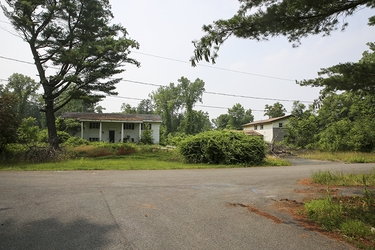Costco’s a go: Outcome of appeal of fifth lawsuit attempting to stop Costco similar to previous four
GUILDERLAND — Justices of the state Supreme Court’s Third Appellate Division in Albany on Thursday upheld the town of Guilderland’s Industrial Development Agency’s decision to condemn and hand over to Pyramid Management Group five discontinued town roads located on the site of a planned Costco Wholesale.
Barring another appeal or lawsuit, this was the last legal hurdle Pyramid had to clear before building the Costo, a project that has already been through the state environmental review process and the town’s planning board review. Pyramid did not respond to Enterprise inquiry on its timetable for construction.
The legal decision is the fifth in four years to uphold the town’s approval process of what was initially a three-site development proposal from Pyramid for over 200 apartments and townhomes; a 160,000-square-foot warehouse-price club; and only recently, a $55 million 120,000-square-foot regional cancer center.
Four of the suits were brought by the same petitioners — Westmere residents Thomas and Lisa Hart along with the owner of 1667 Western Ave., LLC, home to a Mobil gas station and Stewart’s Shop — while a fifth was brought by Save the Pine Bush.
Since first presenting the proposal as all its own, Pyramid has since sold the apartment project site to a Troy developer, and while it still owns the eight parcels slated for the cancer center, Pyramid is not the project’s developer.
This fifth suit, which was the fourth brought by the Harts and their business neighbor, was filed 16 days after the IDA signed off, on Aug. 22, 2023, on $2.2 million in tax breaks and approved taking the roads.
Donald Csaposs, the chief executive of the town’s IDA, told The Enterprise by email this week that the agency is “pleased with the decision rendered today by the Court.”
Lisa Hart in an email stated, “I can only say that my husband and I are sad and very disappointed in the decision. We tried our best for almost 6 years to keep these projects (apartments and Costco) from being developed in this area because they are and will be drastically changing the landscape of Westmere, our neighborhood, and surrounding neighborhoods. We are sad for ourselves and the residents that live in this area who will be negatively impacted by this.”
She went on to say, “The suburban Town of Guilderland that I moved to over 35 years ago has ceased to exist and that makes me sad most of all.”
The framework
The fourth suit filed by the Harts and their local business neighbor made only four claims for overturning the IDA decision, according to their September 2023 complaint:
— “The Proposed Acquisition is premature as Albany County Supreme Court has not ruled on the project’s compliance with the Guilderland Zoning Code” [this is related to an earlier suit];
— “The Condemnation Violates the New York State Constitution and EPDL [Eminent Domain Procedure Law] Public Purpose Requirements”;
— “The IDA Failed to Comply with SEQR [the State Environmental Quality Review Act]”; and
— “The IDA Failed to Comply with the GML” [New York State General Municipal Law].
In New York state, under the section of Eminent Domain Procedure Law that allows a condemnation to be challenged, there are only four grounds for judicial review:
— “The proceeding was in conformity with the federal and state constitutions”;
— “The proposed acquisition is within the condemnor’s statutory jurisdiction or authority”;
— “The condemnor’s determination and findings were made in accordance with procedures set forth in this article and with article eight of the environmental conservation law”; and
— “Public use, benefit or purpose will be served by the proposed acquisition.”
The arguments
During appeal arguments in April, James Bacon, the attorney for the Harts and 1667 Western Ave., LLC, argued that the IDA did not have the requisite authority to condemn public lands without approval from the New York State Legislature, and cited case law that the land still had public use.
The attorney for the IDA, Charles Malcomb, countered that the Harts and 1667 Western Ave. had no claims against the IDA regarding its authority to condemn the roads because they did not challenge the abandonment determination made by the town’s highway superintendent within the window to do so, a four-month period following the decision.
Malcomb argued that the petitioners lacked the standing, a party’s legal right to bring a case or challenge an action in court, because they weren’t the owners of the condemned roads.
But Bacon, citing case law, countered that the Harts did have standing because they used the public streets for recreation.
Bacon argued that Costco, as a “members-only” retailer did not serve a public purpose. But Malcomb said Costco constituted a legitimate public purpose because of the economic benefits it would provide in the form of new jobs, sales-tax revenue, and infrastructure improvements.
When questioned by the court on the “members-only” nature of Costco and whether it undermines the public-purpose argument, Malcomb argued Costco’s membership model was just another type of retail and did not negate the public-use argument.
Bacon argued Pyramid had a self-created hardship, a factor taken into consideration by a governing body, in this instance the IDA, when making a determination on a request: The company secretly bought up the houses in the neighborhood and deliberately allowed them to deteriorate, then used the resulting blight as justification for the condemnation, he said.
That claim was countered with changes made to the town’s zoning law — the creation of a transit-oriented district — that rendered the residential properties non-conforming as well as a disfavored use, which justified the condemnation.
The expedited process
Bacon and Malcomb in early April were making their appeal arguments to justices of the state Supreme Court’s Third Appellate Division, the second tier of the state’s three-tiered judicial system.
What the two attorneys weren’t doing was trying to uphold or overturn the decision of a lower-tiered jurist, a county supreme court justice.
And that’s because the law that allows the IDA to take the land also allows for an expedited appeal process.
When the state’s Eminent Domain Procedure Law was enacted, in 1977, it stitched up a patchwork of condemnation laws that often ended up on the dockets of magistrates in the state’s second judicial tier.
With the drafting of the new eminent-domain law, legislators sought to maintain continuity and consistency within the existing legal framework, a consequence of appellate court justices’ years of domain expertise parsing out complex legal questions.
The decision
In their six-page decision, the appellate court justices first addressed the IDA’s compliance with the State Environmental Quality Review Act.
The Harts and their fellow local business petitioner argued that the IDA failed to comply with the state’s environmental review law because its decision was informed by the planning board’s final environmental impact statement on the project, which meant the IDA was relying on incomplete information because the plans to condemn were not disclosed until after the review had finished.
The court rejected this argument, stating that the IDA had satisfied the requirements of SEQRA because it had incorporated the final environmental impact statement into a board discussion about environmental review.
The court said the Harts had no standing to challenge the IDA’s condemnation of the public roads because they were not the owners of the property. However, the justices stated that 1667 Western Ave. did have the legal ability to challenge the IDA because it was the owner of the property subject to certain deed restrictions associated with the taking.
Addressing what public purpose was served by removing deed restrictions on property in the proposed project area, the court found that, although the condemnation would directly benefit private businesses, the taking served a public good because Costco is envisioned as one part of a larger plan from the town to incentivize regional economic development, which the court said was in the interest of the public, due to the visitors it would attract, jobs it would create, and public coffers it would fill.



